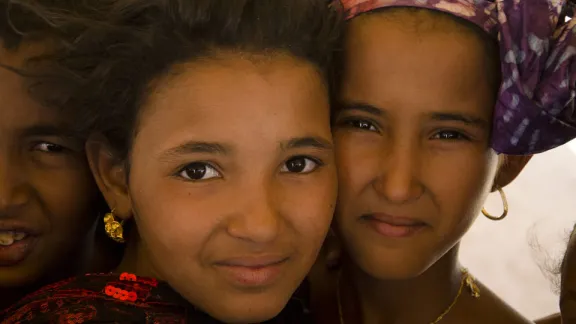
Sisters Fadimata and Mohassa in the LWF-managed Mbere refugee camp in southeastern Mauritania. © LWF/Thomas Ekelund
Enormous Pressure on Already Stretched Resources
It looks like any other school yard, any other school day. But it is actually the first day of school in Camp Mbere, a refugee camp 60 kilometers from the Malian border with Mauritania. Suddenly a camera attracts attention and hundreds of children set off, screaming and laughing.
The northwest African region of the Sahel is on the brink of famine. Governments there, including the Islamic Republic of Mauritania, have declared a state of emergency and called for international assistance. At the same time, thousands of refugees cross the borders of Mali fleeing the clashes in the north between Tuareg rebels and armed forces.
At Mbere, in southeastern Mauritania, The Lutheran World Federation (LWF) provides a safe haven for those fleeing into the country every day.
“I am so grateful to all our staff working at the front line. It’s a high level of sacrifice on their part,” says Kasongo Mutshaila, LWF representative in Mauritania, as he makes his way through the groups of children in the camp.
Through its Department for World Service (DWS) program in the country, the LWF manages Mbere camp on behalf of the United Nations High Commissioner for Refugees (UNHCR).
Mutshaila says this is a risky environment considering the terrorist attacks in the region but staff is very dedicated to their work. “The passion and commitment I can see here [are] stunning,” he says.
A Safe Haven in Need of Support
The fighting in Mali has left more than 60,000 people internally displaced, and a similar number have fled to Mauritania and neighboring countries.
Camp Mbere, spread out over a surface area of some 570 km2 receives an average of 1,000 refugees per day, some days even more. According to the LWF representative, in mid-April the camp population was over 55,000, of which more than half were children.
To Mutshaila, the numbers are about needs. The everyday rising influx of fleeing people means a constant gap between resources and needs. And, he says, the needs are extremely urgent and vast.
The camp population comprises 11,382 families, with each unit allocated a parcel of 50 m2, putting enormous pressure on already stretched resources, Mutshaila comments. Health and sanitation, water and food, shelter–all are absolute necessities and at the same time all rely on assets. Assets that simply are not there.
But to Mutshaila, the solution is obvious. “We have to downsize the camp,” he says. “We are already projecting a population of 80,000 refugees and dividing the camp in two gives us the huge [advantage] of easier logistics, less risk of spreading infections and a safer environment.”
He has taken up the matter with the head of UNHCR but says that the Mauritanian government might be reluctant at first considering insecurity and the fight against terrorism.
Experienced Aid Worker
As head of camp management, LWF Mauritania coordinates activities with all non-governmental organizations (NGOs) working on site, analyzes the needs and resources, provides the refugees with information and puts up tents according to all applicable standards.
“Yes, it’s a huge responsibility we have,” Mutshaila says smiling. “Besides all the physical practicalities, we also need to make the mental situation bearable for the refugees. We need to start giving them psychosocial support to make the day somewhat normal in this abnormal situation.”
The 52-year-old knows what he is talking about. He has been an aid worker for almost 24 years, caring for refugees from Darfur and Rwanda in the Democratic Republic of Congo and Chad in camps five times the size of Mbere.
Deepening Food Crisis Takes Its Toll
But the fighting in Mali is not the only issue of attention. The UN World Food Program says early warning about a foreseen famine in Sahel was not followed by early response. It is not famine yet, but only rapid action would prevent further deterioration of the food security situation and avoid a full-scale crisis.
As the only partner of the global network of churches ACT Alliance in Mauritania, the LWF is assisting the drought-affected population in the country and neighboring Senegal, where one of the local actors is the Lutheran Church of Senegal, an LWF member church, says Mutshaila.
According to the UN Food and Agriculture Organization (FAO), cereal production in the Sahel region in 2011 was on average 25 percent lower than in 2010, but as much as 50 percent lower in Mauritania and Chad. A combination of several factors has contributed to the crisis, including drought; high grain prices; a shortage of fodder for livestock; a reduction in remittances from migrant workers in several countries; environmental degradation; displacement; and worsening chronic poverty.
FAO estimates some 15 million people are at risk because of food insecurity in the region, including some 700,000 in Mauritania, 3 million in Mali and 850,000 in Senegal.
The need for sustainable, structural solutions to food insecurity has helped shape the LWF/ACT response to crises in previous years and will continue to do so as this new humanitarian episode unfolds, notes Mutshaila.
The goal is not only to deliver immediate food aid, but also to help people hit by the crisis provide for themselves in the long-term, he affirms. (879 words)
(Written for LWI by Thomas Ekelund in Mbere, Mauritania)


